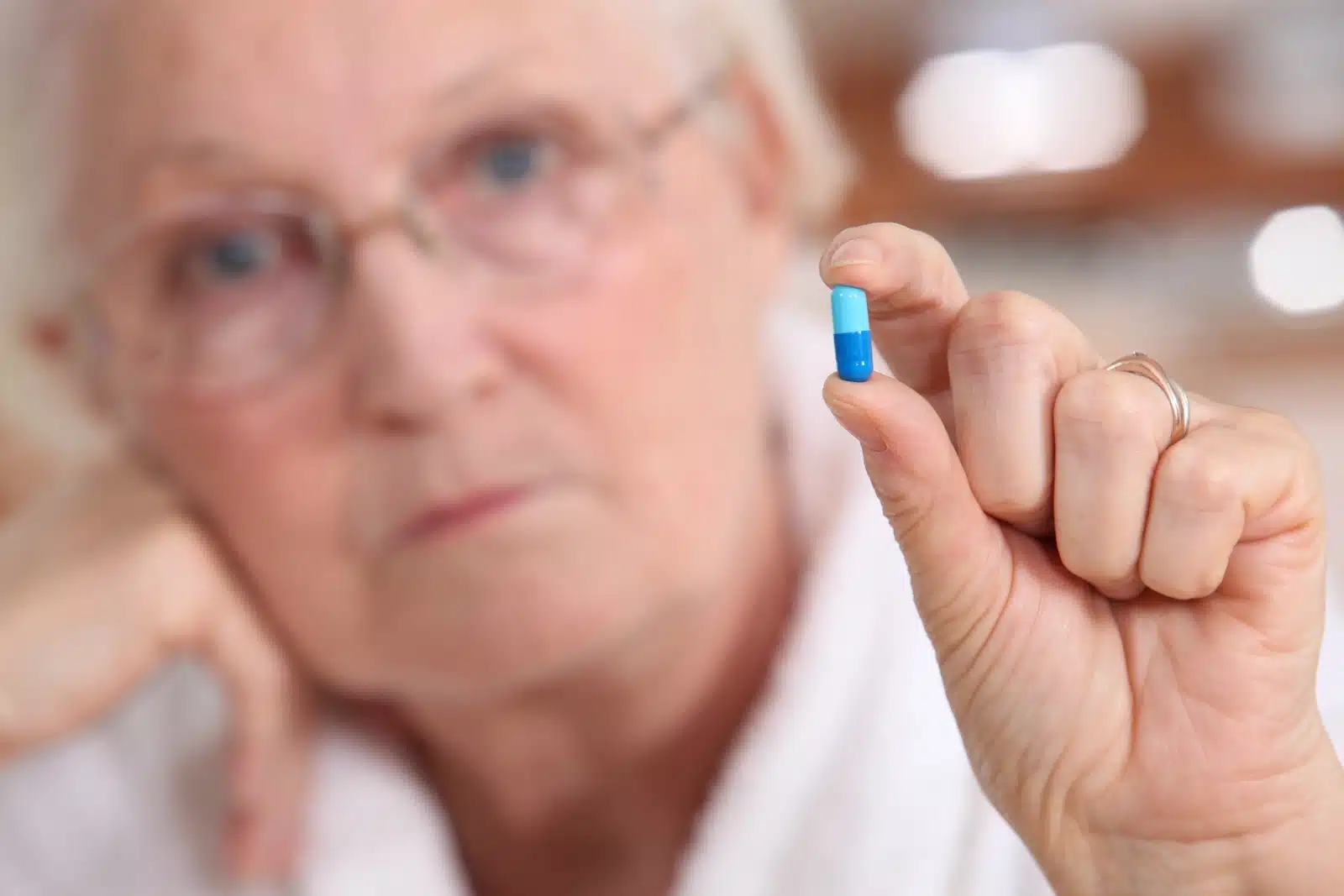Substances
What Is Generic Antabuse? Disulfiram Comparison
Medically Reviewed By
Written By
Last medically reviewed April 14, 2025
Substances
Medically Reviewed By
Written By
Last medically reviewed April 14, 2025

Disulfiram, formerly known by the brand name Antabuse, is a medication used to treat alcohol use disorder (alcohol addiction) by producing unpleasant side effects and sensitivity to alcohol. This drug works by deterring alcohol use by causing illness.
Though Antabuse is no longer on the market, generic disulfiram is in use for treating alcohol use disorder. Learn more about disulfiram and its effectiveness and cost compared to Antabuse.
Disulfiram, formerly sold under the brand Antabuse, is an FDA-approved carbamate derivative medication for alcohol dependence. The drug blocks an enzyme that’s involved in processing alcohol. Disulfiram produces very unpleasant side effects, such as nausea, dizziness, chest pain, fast heartbeat, and flushing, when combined with alcohol, acting as a deterrent to alcohol use.[1]
Drugs like disulfiram may be prescribed to people who struggle with alcohol dependence or alcohol addiction. Combined with addiction treatment, it can prevent drinking by creating a negative association and unpleasant side effects every time you ingest alcohol.
Disulfiram works by blocking an enzyme that’s responsible for metabolizing alcohol, preventing your liver from breaking it down when you drink it. When the body doesn’t metabolize alcohol, it can’t be eliminated, causing you to feel sick.
The specific enzyme that disulfiram blocks is aldehyde dehydrogenase (ALDH). Blocking ALDH causes a negative reaction known as the disulfiram-alcohol reaction.[2] About 10 to 30 minutes after drinking alcohol, you may experience the following symptoms:[3]
These symptoms are uncomfortable, but they’re not usually dangerous. However, there is a risk of a more severe reaction if you consume high amounts of alcohol.

Even small amounts of alcohol can cause unpleasant symptoms like flushing, sweating, nausea, severe vomiting, increased thirst, swelling, throbbing headache, blurred vision, chest pain, shortness of breath, fast heartbeat, confusion, and a light-headed feeling.[4] This is intended to discourage alcohol use.
Disulfiram has additional common side effects, including skin rash, acne, mild headache, tired feeling, impotence, loss of interest in sex, drowsiness, or a metallic or garlic-like taste in the mouth.[5] These side effects are usually mild.
There is a risk of serious side effects with disulfiram, including a dangerous allergic reaction, eye pain or sudden vision loss, numbness or tingling, confusion, unusual thoughts or behaviors, and signs of liver problems with symptoms like stomach pain, itching, tired feeling, loss of appetite, clay-colored stools, and jaundice.[6] Contact your doctor or seek emergency medical treatment if you experience serious side effects.
Disulfiram can have serious drug interactions and contraindications, especially with metronidazole, seizure medications like phenytoin, blood-thinning medications like warfarin, and tuberculosis drugs like isoniazid.[7] Other drugs may interact with disulfiram, so always talk to your doctor about any other prescription or over-the-counter medications and supplements you take.
Any amount of alcohol can cause a reaction with disulfiram. In addition to abstaining from alcoholic beverages, you must avoid products containing small amounts of alcohol, such as aftershave, cologne, perfume, antiperspirant, mouthwash, antiseptic skin products, and hair dyes. Avoid contact with non-consumable alcohol products, such as paint thinners, solvents, stains, and lacquers.
Antabuse was previously used in 250 mg dosages daily. In the first phase of treatment, a maximum of 500 mg daily is given in a single dose for one to two weeks. The maintenance dose is usually 250 mg daily, but it can range from 125 mg to 500 mg.[8] The cost of an Antabuse 250 mg oral tablet was about $46 for a supply of 10 tablets, but it varied by pharmacy.[9]
As a generic form of Antabuse, disulfiram is available in 250 mg and 500 mg tablets in quantities of 30 tablets. The dosing recommendations are also similar, with a typical starting dose of up to 500 mg by mouth once a day for one to two weeks, then an adjusted dosage that falls from 125 mg to 500 mg once daily.[10] The average cost for 30 tablets of 250 mg disulfiram retails over $100 in November 2024, but it can vary by pharmacy, insurance coverage, and available discounts.[11]
Everyone struggling with substance abuse is unique. Medication and therapies for one person may not work for another, so treatment must be individualized. Disulfiram can be effective for treating alcohol dependence and addiction, both in its generic and former brand-name Antabuse forms.
However, there are some important considerations:
Unlike some other addiction treatment medications, disulfiram doesn’t work to decrease cravings. Naltrexone (Vivitrol) works to decrease cravings, which is why it’s often a first-choice treatment option for alcohol use disorder. Acamprosate is another option to help with cravings, but the research is mixed.
To take disulfiram, you must have gone at least 12 hours without alcohol.[12] If there’s still alcohol in your system, you will likely feel sick as soon as you take disulfiram. For some people, drugs like naltrexone may be a better choice for this reason.
Research suggests that disulfiram is most effective if it’s taken under supervision, usually as part of an alcohol addiction treatment program. While it may be prescribed for outpatient treatment, it often requires accountability to a friend or family member to make sure you stick to your medication regimen. Otherwise, you may neglect to take your medication to avoid the unpleasant effects.
Disulfiram can help treat alcohol dependence, which is when your body becomes used to the presence of alcohol and needs it to function, and alcohol addiction, which is a compulsive pattern of alcohol use. Disulfiram helps as an alcohol deterrent, but it needs to be combined with comprehensive addiction treatment to be fully effective. This may include inpatient or outpatient treatment with a combination of traditional talk therapy, group counseling, and behavioral therapies like cognitive behavioral therapy.
Doses of disulfiram are used under medical supervision. Once you’re stable and have sustained long-term abstinence, it may be possible to take disulfiram without the accountability of a friend or family member monitoring your medication use.
About 80 to 95% of disulfiram is absorbed slowly by the gastrointestinal tract and filtered through the body.[13] As much as 20% is eliminated gradually to stay in the body for two weeks.[14] If you consume alcohol at any time during this period, you may experience uncomfortable side effects.
If you relapse and drink alcohol while taking disulfiram, you may experience a disulfiram-alcohol reaction. Even if you’re not actively taking disulfiram anymore, it can stay in your system for up to two weeks. If you experience a disulfiram-alcohol reaction, call your doctor. Severe symptoms may require emergency medical attention.
It’s not a good idea to stop taking disulfiram just to drink alcohol due to its length of time in the body. In addition, some people recovering from alcohol use disorder need to avoid alcohol forever.
Disulfiram is an FDA-approved medication to treat alcohol use disorder and the generic version of the now-discontinued Antabuse brand. It works as an alcohol deterrent that creates a negative reaction if you drink alcohol while taking it. As part of a comprehensive alcohol addiction treatment program, disulfiram can be effective for treating alcohol use disorder, but it’s not right for everyone.
Disulfiram 500 mg cost $1.93 per tablet or $57.91 for 30 tablets in November 2024.[15] However, the cost can vary by pharmacy and insurance coverage.
Most private health insurance plans offer coverage for disulfiram as part of an addiction treatment program. The treatment of substance use disorders is now widely included in most insurance plans, but it can vary by your plan and provider.
The generic form of Antabuse, a now-discontinued brand-name drug, is disulfiram. Disulfiram is used as a deterrent for alcohol as part of a comprehensive treatment plan for alcohol use disorder.
Naltrexone and disulfiram are both prescription medications used to treat alcohol use disorder, but they work differently and have different side effects. Discussing your options with your doctor is important to determine the best choice for your needs.
Antabuse was produced by Sanofi, which reportedly removed the drug from the market following stock shortages and long-term supply issues.[16] Generic versions are still widely available.
[1,2,3,4,5,6,7] Disulfiram: Uses, dosage, side effects & warnings. Drugs.com. (n.d.-b). Retrieved from https://www.drugs.com/disulfiram.html on 2024, November 7.
[8] Antabuse Dosage Guide. Drugs.com. (n.d.-a). Retrieved from https://www.drugs.com/dosage/antabuse.html on 2024, November 7.
[9] Antabuse prices, coupons, copay cards & patient assistance. Drugs.com. (n.d.-b). Retrieved from https://www.drugs.com/price-guide/antabuse#:~:text=The%20cost%20for%20Antabuse%20250,on%20the%20pharmacy%20you%20visit on 2024, November 7.
[10] Disulfiram: Uses, dosage, side effects & warnings. Drugs.com. (n.d.-d). Retrieved from https://www.drugs.com/disulfiram.html#dosage on 2024, November 7.
[11] Disulfiram (Antabuse): Uses, side effects, Interactions & More. GoodRx. (n.d.-a). Retrieved from https://www.goodrx.com/disulfiram/what-is#dosage on 2024, November 7.
[12] Disulfiram: Uses, dosage, side effects & warnings. Drugs.com. (n.d.-d). Retrieved from https://www.drugs.com/disulfiram.html#before-taking on 2024, November 7.
[13,14] Treatment, C. for S. A. (1970, January 1). Chapter 3-Disulfiram. Incorporating Alcohol Pharmacotherapies Into Medical Practice. Retrieved from https://www.ncbi.nlm.nih.gov/books/NBK64036/#:~:text=Disulfiram%20absorption%20and%20elimination,Go%20to on 2024, November 7.
[15] Disulfiram (Antabuse): Uses, side effects, Interactions & More. GoodRx. (n.d.-a). Retrieved from https://www.goodrx.com/disulfiram/what-is#dosage on 2024, November 7.
[16] Times, T. B. (n.d.). Antabuse drug to stay off alcohol no longer available, a “disaster” for Alcoholics. The Brussels Times. Retrieved from https://www.brusselstimes.com/452000/antabuse-drug-to-stay-off-alcohol-no-longer-available-a-disaster-for-alcoholics on 2024, November 7.